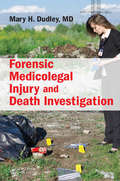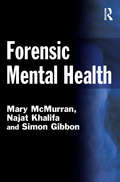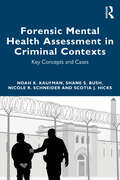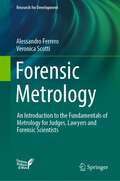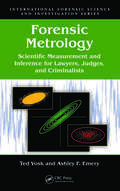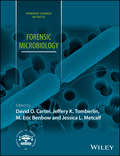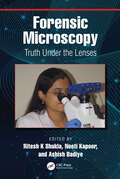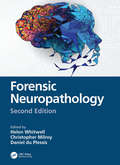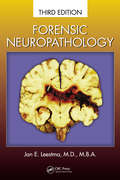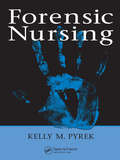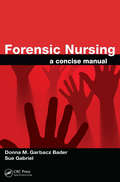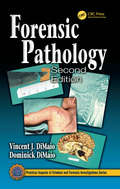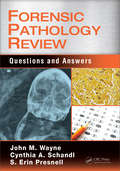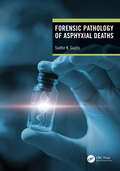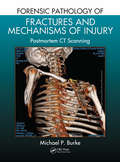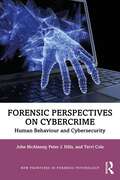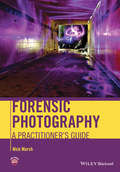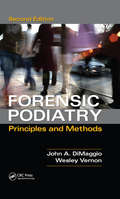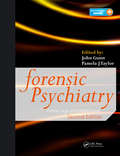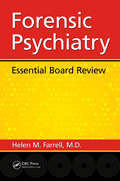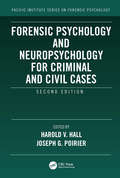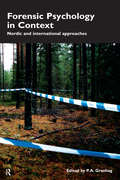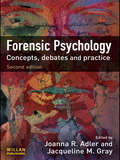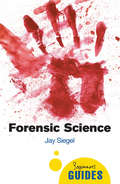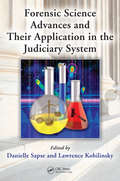- Table View
- List View
Forensic Medicolegal Injury and Death Investigation
by Mary H. Dudley, M.D.Introducing the basic concepts of clinical forensic medicine and death investigation, this book covers the main areas of forensic investigation . It provides an introduction to forensic science and coverage of injury patterns, natural disease, accidental trauma, child injury and fatalities, and domestic violence. Anyone who has direct contact with death, crime, and the medicolegal system, including nurses, physicians, attorneys, death investigators, forensic pathologists, and police detectives, will find this an invaluable reference.
Forensic Mental Health (Criminal Justice Series)
by Mary McMurran Najat Khalifa Simon GibbonThis book provides a concise introduction to the increasingly important field of forensic mental health. It aims to set out both the key concepts in forensic mental health as well as the way the discipline operates in the broader context of criminal justice and mental health care systems. It will provide an ideal introduction to the subject for students taking courses in universities and elsewhere, for mental health practitioners in the early stages of their careers, and for professionals from other agencies needing an informed and up-to-date account of forensic mental health.
Forensic Mental Health Assessment in Criminal Contexts: Key Concepts and Cases
by Noah K Kaufman Shane S Bush Nicole R. Schneider Scotia J. HicksThis valuable compendium advances the understanding of mental health case law, making it highly accessible to practicing forensic professionals. Divided into two parts, the first section focuses on explaining important topics related to forensic psychological and forensic neuropsychological assessment, while the second section stands on its own as a collection of fascinating legal cases with high relevance to mental health and legal professionals interested in how mental health disorders impact criminal behavior among juveniles and adults. The book begins with an accessible primer on abnormal behavior, exploring the links between criminal behavior and mental health disorders. It goes on to thoroughly describe what goes into forensic psychological and forensic neuropsychological evaluations, including discussion about the Federal Rules of Evidence, as they pertain to evidence-generation during the mental health evaluation process. The book also focuses on psychometric concepts, including reliability, validity, sensitivity, and specificity, as well as an exploration of ‘science’ and ‘the law’ which includes a discussion about the difference between science and pseudoscience, the different sources of law (constitutions, statutes, and case law), and how the intellectually competitive practice of law is similar to the enterprise of science. Ethical issues faced by the forensic mental health worker are also addressed. The second section of the book, Legal Cases for the Forensic Mental Health Professional, is an alphabetical summary of important and interesting legal cases with relevance for mental health professionals. These cases offer real-world significance while summarizing complex legal decisions through a neuropsychological sieve, to allow both legal and psychological communities to better understand each other’s professions. This book will be an invaluable resource for forensic psychologists, forensic neuropsychologists, forensic psychiatrists, and other mental health professionals whose work brings them into contact with the juvenile justice and adult criminal justice system. It will also be of interest to legal professionals, criminal justice departments, and law schools.
Forensic Metrology: An Introduction to the Fundamentals of Metrology for Judges, Lawyers and Forensic Scientists (Research for Development)
by Alessandro Ferrero Veronica ScottiThis book offers up-to-date information and guidance on the application of metrology in legal proceedings, clarifying the limits of validity of scientific evidence and presenting an illuminating series of case studies in which measurement uncertainty has played an important role. The fundamental concepts of metrology are discussed, and it is explained how metrology is capable of quantifying the reliability of measurement results and thereby contributing to appropriate decision making. With the aid of the presented case studies, this book will assist readers in understanding how legal decisions should be made in the presence of uncertainty. Areas covered in those studies include breath alcohol concentration analysis, and DNA profiling. Nowadays, decisions in most legal cases are based on evidence obtained through scientific analysis involving the acquisition of accurate measurements. Against this background, Forensic Metrology will be of value for lawyers and judges in both civil and common law countries, as well as engineers and other scientists with an interest in the subject.
Forensic Metrology: Scientific Measurement and Inference for Lawyers, Judges, and Criminalists (International Forensic Science and Investigation)
by Ted Vosk Ashley F. EmeryForensic metrology is the application of scientific measurement to the investigation and prosecution of crime. Forensic measurements are relied upon to determine breath and blood alcohol and drug concentrations, weigh seized drugs, perform accident reconstruction, and for many other applications. Forensic metrology provides a basic framework for th
Forensic Microbiology (Forensic Science in Focus)
by David O. Carter M. Eric Benbow Jeffery K. Tomberlin Jessica L. MetcalfForensic Microbiology focuses on newly emerging areas of microbiology relevant to medicolegal and criminal investigations: postmortem changes, establishing cause of death, estimating postmortem interval, and trace evidence analysis. Recent developments in sequencing technology allow researchers, and potentially practitioners, to examine microbial communities at unprecedented resolution and in multidisciplinary contexts. This detailed study of microbes facilitates the development of new forensic tools that use the structure and function of microbial communities as physical evidence. Chapters cover: Experiment design Data analysis Sample preservation The influence of microbes on results from autopsy, toxicology, and histology Decomposition ecology Trace evidence This diverse, rapidly evolving field of study has the potential to provide high quality microbial evidence which can be replicated across laboratories, providing spatial and temporal evidence which could be crucial in a broad range of investigative contexts. This book is intended as a resource for students, microbiologists, investigators, pathologists, and other forensic science professionals.
Forensic Microscopy: Truth Under the Lenses
by Ritesh K. Shukla Neeti Kapoor Ashish BadiyeForensic Microscopy: Truth Under the Lenses provides an overview and understanding of the various types of microscopes and their techniques employed in forensic science. The book emphasizes both the theoretical and practical aspects of microscopy to enrich the reader’s understanding of the various tools, techniques, and utility—including strengths and weaknesses—of types of microscopes in analyzing certain forms of evidence. The book begins with the history of microscopes, the basic optics for microscopy, then moves to advanced microscopies such as electron microscopes and atomic force microscopes. In addition to the various types of microscopes and how to use and best utilize them, the book looks at the analysis of specific types of evidence, including hair, fiber, fingerprint, body fluids, tool marks, ink, pollen grains, spores, diatoms, bullets, cartridges, among other evidence types. Since forensic science is an applied, hands-on discipline, the book includes both a theoretical and a practical approach to the topic. Key Features: • Addresses simple to advanced microscopy techniques for the effective analyses of trace evidence • Pairs chapters on a particular type of microscopy, explaining it thoroughly, before delving into specific usage for forensic applications • Presents theories and as well as real-world application of concepts • Provides abundant micro-photographs, including graphical representations and flow charts, to illustrate concepts clearly Forensic Microscopy serves as a helpful reference for undergraduate and postgraduate students in forensic science, forensic biology, forensic chemistry and related programs. It is also recommended for research students, academicians, technicians, industry and laboratory professionals working on trace evidence analysis.
Forensic Neuropathology
by Helen Whitwell Christopher Milroy Daniel Du PlessisForensic neuropathology is an important specialty within forensic pathology. In addition to traumatic brain injury in the adult and child, forensic neuropathologists must also consider the role of natural disease within the forensic setting such as cerebrovascular disease, as well as neurotoxicology. Focusing on difficulties that arise in the medico-legal context, the chapters include techniques for the post-mortem examination of the brain and related structures. Forensic pathologists, neuropathologists, general pathologists, clinical forensic specialists as well as neuroscientists, neurologists and neurosurgeons will all find useful information. In addition, members of the legal profession have found this an important reference work. Chapters have been extensively revised and new content includes - Chronic traumatic encephalopathy-related pathology - Sudden unexplained death in epilepsy - Biomechanics of head injury - Updates on pathological aspects of head injury including infant head injury with ocular pathology - Clinical aspects of head injury and spinal injury including a new chapter on neuroradiology Reviews of the First Edition This outstanding book is unique. Well-illustrated with high-quality colour photographs and line drawings, it reads well. Strongly recommended for trainees in histopathology, neuropathology, paediatric pathology, and forensic pathology, as well as for consultants practising in these fields.
Forensic Neuropathology
by Jan E. LeestmaThe field of forensic neuropathology covers such controversial topics as the effects of repeated brain trauma in football players and how babies probably cannot die from being shaken. Jan Leestma is one of the most respected voices in this area. A timely update to his classic reference, Forensic Neuropathology: Third Edition presents an encyclopedi
Forensic Nursing
by Kelly M. PyrekWritten by an award-winning investigative journalist with more than twenty years of experience, Forensic Nursing takes an objective yet engaging look at a profession that according to the author, "is only for those with a strong stomach, a pure heart, and a quick mind." It presents the personal experiences and perspectives of forensic nurses that w
Forensic Nursing: A Concise Manual
by Donna M. Garbacz Bader Sue GabrielThe forensic nurse has a powerful role in medical-legal investigations. Going beyond the nurse‘s traditional role, forensic nurses are often at the forefront of evidence collection and preservation. They can maintain an evidentiary chain of custody, testify as an expert witness in a court of law, care for victims, assist victims families, and work
Forensic Pathology
by Myron H. Dembo Helena Seli Vincent J.M. DiMaio M.D. Dominick DiMaioMedicolegal investigation of death is the most crucial and significant function of the medical examiner within the criminal justice system. The medical examiner is primarily concerned with violent, sudden, unexpected, and suspicious deaths and is responsible for determining the cause and manner of death, identifying the deceased, determining the ap
Forensic Pathology Review: Questions and Answers
by Md John Wayne Cynthia Schandl S. PresnellThis book is an invaluable tool for studying and reviewing key concepts in forensic pathology. Written in a question-and-answer format, this accessible guide tests readers' knowledge of manner of death, patterns of injury, lab data interpretation, postmortem radiography and imaging, and much more. Over 300 questions, more than half with visual examples, cover both common and more unusual examples of forensic pathology seen in practice. A great resource for preparing for examinations including the American Board of Pathology examination. It provides answers with explanatory rationales for both correct and incorrect answers.
Forensic Pathology of Asphyxial Deaths
by Sudhir K GuptaThis book provides an overview of Asphyxial Deaths which includes hanging, strangulation, choking, smothering, gagging, drowning, aspiration, mechanical and chemical asphyxiants, etc. Postmortem examination often leads to doubts as a clear distinction between the different type of asphyxia cannot be made easily. Forensic and physiological aspects are discussed with the help of illustrative cases. The author discusses the different aspects of asphyxia deaths and substantiates multiple case studies to establish a scientific approach that can act as a guideline to the autopsy surgeon in providing a precise opinion and clarify doubts for the judiciary involved in such criminal justice cases. Key Features• Presents individual case studies of Asphyxial deaths. • Covers the guidelines to be followed by the autopsy surgeons in different cases.• Discusses the physiological aspects of Asphyxial deaths in detail.• Illustrates the cases in a stepwise manner with more than 350 colored photographs of postmortem examination.
Forensic Pathology of Fractures and Mechanisms of Injury: Postmortem CT Scanning
by Michael P. BurkePractitioners of forensic medicine have various tools at their disposal to determine cause of death, and today‘s computed tomography (CT) can provide valuable clues if images are interpreted properly. This volume is a guide for the forensic pathologist who wants to use CT imaging to assist in determining the mechanism of injury that might have contributed to death. Enhanced with hundreds of CT images that clarify the text and case studies to put the material in context, the book gives a head-to-toe catalogue of various injuries and how they are represented on a CT scan.
Forensic Perspectives on Cybercrime: Human Behaviour and Cybersecurity (New Frontiers in Forensic Psychology)
by Peter J. Hills Terri Cole John McAlaneyForensic Perspectives on Cybercrime is the first book to combine the disciplines of cyberpsychology and forensic psychology, helping to define this emergent area. It explores the psychological factors that influence the behaviour of all those involved in cybersecurity, drawing upon the research literatures in relevant areas including forensic, social, and cyberpsychology.Written by leading figures in the field, the book provides an introduction to the cybercrime ecosystem, before discussing the psychological manipulation of targets through social engineering techniques and highlighting the unique threats that this type of attack presents. The reasons why people become involved in hacking are explored, and the authors review research literature on risk factors of being a victim of cybercrime, along with the concept of resilience. Behaviour change and prevention strategies are also evaluated, as well as the role of emergent technologies such as artificial intelligence and what this may mean for the role of humans in cybersecurity. Case studies and real-world examples are woven throughout to illustrate key issues, opportunities, and challenges.This unique text is a must-read for students undertaking any degree that relates to behaviour and cybersecurity, including psychology, computing, law, and business management. It is also highly relevant to researchers, practitioners, and policymakers who work in cybersecurity and/or have an interest in empowering people to be safe online.
Forensic Photography
by Nick MarshForensic photography plays a vitally important part in the investigation of crime and the subsequent administration of justice. Written by a practitioner with many years professional experience, this book provides an overview of the most common forensic photography techniques in use today for those readers who may not have a detailed understanding of camera techniques and who need to get to grips with the use of light and other key scientific aspects of the job. It covers image capture issues, file handling and relevant equipment, such as lasers and UV lights, and explores how they work. The predominance of the digital camera has resulted in an increasing trend for police forces across the world to use untrained camera users, rather than expert photographers. Therefore, this book will prove invaluable for those practitioners who need to produce accurate and clear photographic evidence, above and beyond the point and shoot mode on their cameras.
Forensic Podiatry: Principles and Methods, Second Edition
by Denis Wesley Vernon John A. DiMaggioForensic Podiatry: Principles and Methods, Second Edition has been completely updated to reflect the latest developments and advancements in this changing field. New additions to the book, from the previous edition, include all new chapters on the expert witness, Frye Test, and Daubert Standard, as well as revised theories on gait analysis, bare footprint identification, and footwear examination. The new edition includes extensive case studies and an international compilation of current best practices. Since this text’s first publication, the field of forensic podiatry has rapidly developed from relative obscurity to a dynamic, internationally recognized discipline. Forensic podiatrists have been able to advance improvements in the field, both in widening the range of applications and deepening the practice through improved techniques to strengthen evidentiary conclusions. Written by two pioneers in the field, Forensic Podiatry includes over one hundred detailed illustrations to serve as an invaluable resource for students, practicing forensic podiatrists, legal professionals and those new to the profession.
Forensic Psychiatry: Clinical, Legal and Ethical Issues, Second Edition
by John Gunn Ian D. Hutcheon Pamela TaylorHighly Commended, BMA Medical Book Awards 2014Comprehensive and erudite, Forensic Psychiatry: Clinical, Legal and Ethical Issues, Second Edition is a practical guide to the psychiatry of offenders, victims, and survivors of crime. This landmark publication has been completely updated but retains all the features that made the first edition such a w
Forensic Psychiatry: Essential Board Review
by Helen Mavourneen Farrell M.D.An invaluable study guide for doctors preparing for the forensic psychiatry board exam or for those seeking recertification, this book is a concise and practical aid for mastering forensics, making key principles easy to understand and memorize. The book offers readers important advice on everything from registering for the examination to effective studying techniques. It provides a broad review of important forensic psychiatry topics as well as important mental health legal cases. It also includes more than 100 board-style questions along with answers and detailed explanations for self-assessment.
Forensic Psychology and Neuropsychology for Criminal and Civil Cases (Pacific Institute Series on Forensic Psychology)
by Harold V. Hall and Joseph G. PoirierToday's increasingly sophisticated psychological and neuropsychological assessments allow for a greater understanding, and improved evaluations, in forensic psychology. By integrating discussions of modern psychological and neuropsychological tests, with extant civil and criminal cases, Forensic Psychology and Neuropsychology for Criminal and Civil Cases, Second Edition serves as a fully-updated, professional resource outlining modern behavioral science’s impact on the legal system. This second edition synthesizes the theoretical, empirical, and clinical literature, examining it through the lens of case application. The book is divided into three parts to look at foundational legal, ethical and applied issues; criminal forensic evaluations; and civil forensic evaluations. Chapters new to this edition address substance abuse and intoxication, interviewing and interrogation, criminal profiling, faked amnesia and recall skills, post-concussive syndrome (PCS), post-traumatic stress disorder (PTSD), and trends and research directions. Clinicians, researchers and psychologists practicing in any number of related fields will be able to address relevant questions from both criminal-forensic and civil-forensic perspectives. Key features: Presents the latest advances in methodology and technology to assist forensic professional in assessment and case formulation in the search for ground truth in applied settings Outlines base rates for forensic areas of concern, especially helpful in evaluation, report writing and courtroom testimony as an expert witness Addresses complex criminal issues such as competency to stand trial, criminal responsibility, mitigating defenses, and violence risk Forensic Psychology and Neuropsychology for Criminal and Civil Cases, Second Edition is an invaluable resource to clinicians, experts witnesses, and legal professionals—a helpful adjunct for mental health experts to formulate sound direct and cross-examination strategies, and eliciting suggestions for forensically-related treatment and intervention.
Forensic Psychology in Context: Nordic and International Approaches
by P. A. GranhagAcademics and researchers from the Nordic countries (Sweden, Iceland, Norway, Finland) have made a particularly strong contribution internationally to the rapidly developing disciplines of forensic and legal psychology. This book brings together the leading authorities in the field to look systematically at the central issues and concerns of their subject, looking at both investigative psychology and psychology in court. Forensic Psychology in Context reflects the results of research in the Nordic countries themselves, but each chapter situates this work within a broader comparative and international context. The book is a major contribution to the subject, and will be essential reading for anybody with interests in this field.
Forensic Psychology: Concepts, Debates and Practice
by Joanna R. Adler Jacqueline M GrayThis book brings together academics, practitioners and experts in the field of forensic psychology to demonstrate the scope of the discipline and push its parameters. Its aim is to go beyond introductory texts to challenge perceptions, to raise questions for research and to pose problems for practice. The editors hope to inspire and stimulate debate about how forensic psychology can aid the practice of justice. The book is divided into six sections, addressing key topics from the discipline: investigation and prosecution; testimony and evidence; serious and persistent offending; treatment as intervention; intervention and prevention and punishment and corrections. The contributors are drawn from the UK, the USA and Australia.This updated, revised and significantly expanded edition develops the picture of diversity and depth of forensic psychology; considers ways in which the discipline has progressed and identifies challenges for its future sustainability and growth. includes a new section on treatment as intervention with contributions on personality disordered offenders; anger control group work with forensic psychiatric inpatients; and developments in treatment for drug misuse offenders additional chapters throughout including contributions on UK police interviews; the investigation and prosecutoin of rape; the effect of gender in the courtroom; forensic psychology and terrorism; the aetiology of genocide; self harm in prisons; post-corrections reintegration and many more an innovative textbook on forensic psychology exploring application of the subject and setting forensic psychology in a broader context demonstrates ways in which forensic psychology can aid the practice of criminal justice This book will be essential reading for students of forensic psychology and practitioners working in the field.
Forensic Science
by Jay SiegelIn the wake of the phenomenal success of such shows as CSI, forensic science has never been so popular. The obsessive attention to detail that Grissom and his crew afford seemingly insignificant details, such as particles of dirt in a bullet wound and the presence of pollen in tyre tracks, have had audiences eager to know more. Siegel's study follows the course of evidence all the way from the crime scene right through to the court judgement, investigating the many types of evidence, how they occur in crimes, how they are collected and analyzed by scientists, and how the results are presented in court. Packed with real examples, the book covers all the major areas of forensic science including drugs, trace evidence, pathology, entomology, odontology, anthropology, crime scene investigation, and law.
Forensic Science Advances and Their Application in the Judiciary System
by Lawrence Kobilinsky Danielle SapseThis volume examines how new cutting edge forensic techniques are currently being applied or have the potential to be applied in judicial proceedings. Examples include new applications of Raman spectroscopy, quantum chemistry, lithium in DNA analysis, and the burgeoning area of toxicogenetics. In each case legal issues are addressed, including the
